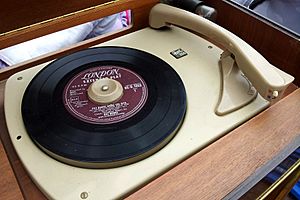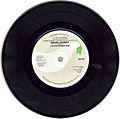Extended play facts for kids
An extended play (often called an EP) is a type of music release that has more songs than a single but fewer than a full album. Think of it as a mini-album! EPs usually have about 10 to 25 minutes of music. In comparison, a single typically has less than 10 minutes, and a full album usually lasts between 25 and 80 minutes. EPs are a great way for artists to share new music with fans without releasing a whole album.
Contents
What is an EP?
An EP is a collection of songs that is longer than a single but shorter than an album. It's like the middle child of music releases. EPs often have between four and six songs. They are a popular choice for musicians who want to release new material more often than they would with a full album.
Why Artists Release EPs
Artists might release an EP for several reasons. Sometimes, it's a way to introduce new songs before a big album comes out. It can also be a way to test out new sounds or styles. For new artists, an EP is a good first step to show off their music without the cost and time needed for a full album. EPs are also common when artists want to release a few songs from a recording session that didn't fit on their main album.
EPs in Music History
EPs first became popular with vinyl records. They were often 7-inch records that played at 45 revolutions per minute (RPM). These records could hold more music than a typical single. In the 1950s, EPs were very popular, especially for rock and roll artists. They offered fans more music for their money than a single.
EPs Today
Even with CDs and digital music, EPs are still very common. Many artists release digital EPs on streaming services. This allows them to share new music quickly and keep their fans excited. EPs are also popular for remixes or live recordings of songs.
Related pages
Images for kids
-
Extended-play vinyl record of Michael Nesmith's "I Fall To Pieces".
See also
 In Spanish: Extended play para niños
In Spanish: Extended play para niños




